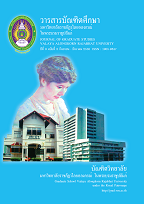ผลกระทบและการปรับตัวของผู้ป่วยโรคโลหิตจางธาลัสซีเมียวัยผู้ใหญ่ตอนต้น กรณีศึกษาผู้ป่วยชมรมโรคโลหิตจางธาลัสซีเมียโรงพยาบาลจุฬาลงกรณ์ EFFECT AND ADJUSTMENT OF THALASSEMIA DISEASE PATIENTS IN EARLY ADULTHOOD : A CASE STUDY OF THE THALASSEMIA CLUB OF CHULALON
Main Article Content
Abstract
บทคัดย่อ
การวิจัยในครั้งนี้มีวัตถุประสงค์เพื่อศึกษาผลกระทบและการปรับตัวทางด้านร่างกายด้านจิตใจ และด้านสังคม ของผู้ป่วยโรคโลหิตจางธาลัสซีเมียวัยผู้ใหญ่ตอนต้น เป็นการศึกษาวิจัยเชิงคุณภาพ โดยดำเนินการเก็บรวบรวมข้อมูลจากการสัมภาษณ์แบบเจาะลึก และการสังเกตแบบไม่มีส่วนร่วม ผู้ป่วยโรคโลหิตจางธาลัสซีเมียวัยผู้ใหญ่ตอนต้น ที่มารับการรักษาที่โรงพยาบาลจุฬาลงกรณ์ มีอายุระหว่าง 20 – 40 ปี จำนวน 8 ราย โดยการเลือกแบบเฉพาะเจาะจง
ผลการวิจัย พบว่า โรคโลหิตจางธาลัสซีเมียส่งผลกระทบต่อผู้ป่วยวัยผู้ใหญ่ตอนต้นในด้านร่างกาย คือ พัฒนาการทางร่างกายของผู้ป่วยจะไม่เป็นไปตามวัย ตัวเหลือง ตาเหลือง ดั้งจมูกแบน โหนกแก้มสูง ท้องใหญ่ขึ้นเนื่องจากตับและม้ามโต และหางานทำได้ยาก ผู้ป่วยมีการปรับตัวทางด้านร่างกายโดยการ ดูแลสุขภาพร่างกายของตนเอง เลือกทำงานที่เหมาะสมกับตนเอง ตกลงกับนายจ้างในเรื่องของการลางานเพื่อไปพบแพทย์ หลังจากปรับตัวได้ ผู้ป่วยรู้สึกว่าร่างกายของตนเองแข็งแรงขึ้น ไม่เหนื่อยง่าย ใช้ชีวิตได้เหมือนคนปกติมากขึ้น และมีอาชีพที่เหมาะสมกับร่างกายของตนเอง ส่วนด้านจิตใจ ผลกระทบด้านจิตใจ ทำให้ผู้ป่วยรู้สึกเศร้าเสียใจ รู้สึกโกรธตัวเอง เบื่อกับการรักษา และบางรายไม่อยากจะมีชีวิตอยู่ต่อไป ผู้ป่วยมีการปรับตัวทางด้านจิตใจ โดยการ นึกถึงคำพูดและกำลังใจจากบุคคลสำคัญ ยอมรับในสิ่งที่ตนเองเป็น มองสิ่งที่เกิดขึ้นในเชิงบวก หลังจากปรับตัวได้ ผู้ป่วยมีอารมณ์ที่มั่นคงขึ้นไม่คิดมาก และสามารถยอมรับอยู่กับสิ่งที่ตนเองเป็นได้ ส่วนด้านสังคม ผลกระทบด้านสังคม คือ ผู้ป่วยส่วนใหญ่จะต้องอยู่แต่กับครอบครัว ไม่ชอบเข้าสังคม แตกต่างและแปลกแยกจากคนอื่น ผู้ป่วยมีการปรับตัวทางด้านสังคมโดยการ พูดคุยและมีเพื่อนที่เป็นโรคเดียวกัน เข้าชมรมโรคโลหิตจางธาลัสซีเมีย ออกไปพบปะกับเพื่อนฝูง หลังจากปรับตัวได้ ผู้ป่วยมีเพื่อนที่สนิทและเข้าใจ และชีวิตมีความสุขมากขึ้น
ABSTRACT
The purpose of this qualitative study was to determine the effects of body, mental, and social adjustment of the thalassemia patients in early adulthood. The research tools were gathered by in-depth interview and non-participant observation. Total 8 participants aged between 20-40 years old were recruited by purposive sampling from the Thalassemia Association, King Chulalongkorn Memorial Hospital.
The results revealed that the thalassemia disease had physical, mental, and social effects to the patients. For physical effects, the patients presented abnormal growth, jaundice, flat bridge of nose, high cheekbone, and enlarged spleen and liver which influenced to difficulty in job acceptance. The patients’ physical adjustments were done by taking care of their physical health, selecting a suitable job, and making agreement with their employers about absence for doctor appointment. After those adjustments, the patients felt healthier like normal people and able to work in suitable jobs related to their physical conditions. For mental effects, the patients were sad, self-hatred, uninterested to treatment, and even unwanted to live anymore. The patients’ mental adjustments were reminding to word and encouragements from their companions, accepting themselves, and thinking positive. After improved adjustments, the patients had stable emotion, relief, and self-acceptance. For social aspects, the patients were family-dependent, less socializes, and feeling discriminated from other. The patients’ social adjustments were being socializes with other thalassemia patients and participating in the Thalassemia Association. After social adjustments, the patients had built-up strong friendships and more happiness.
Article Details

This work is licensed under a Creative Commons Attribution-NonCommercial-NoDerivatives 4.0 International License.
บทความทุกเรื่องได้รับการตรวจความถูกต้องทางวิชาการโดยผู้ทรงคุณวุฒิ ทรรศนะและข้อคิดเห็นในบทความ Journal of Global of Perspectives in Humanities and Social Sciences (J-GPHSS) มิใช่เป็นทรรศนะและความคิดของผู้จัดทำจึงมิใช่ความรับผิดชอบของบัณฑิตวิทยาลัย มหาวิทยาลัยราชภัฏวไลยอลงกรณ์ ในพระบรมราชูปถัมภ์ กองบรรณาธิการไม่สงวนสิทธิ์การคัดลอก แต่ให้อ้างอิงแหล่งที่มา


